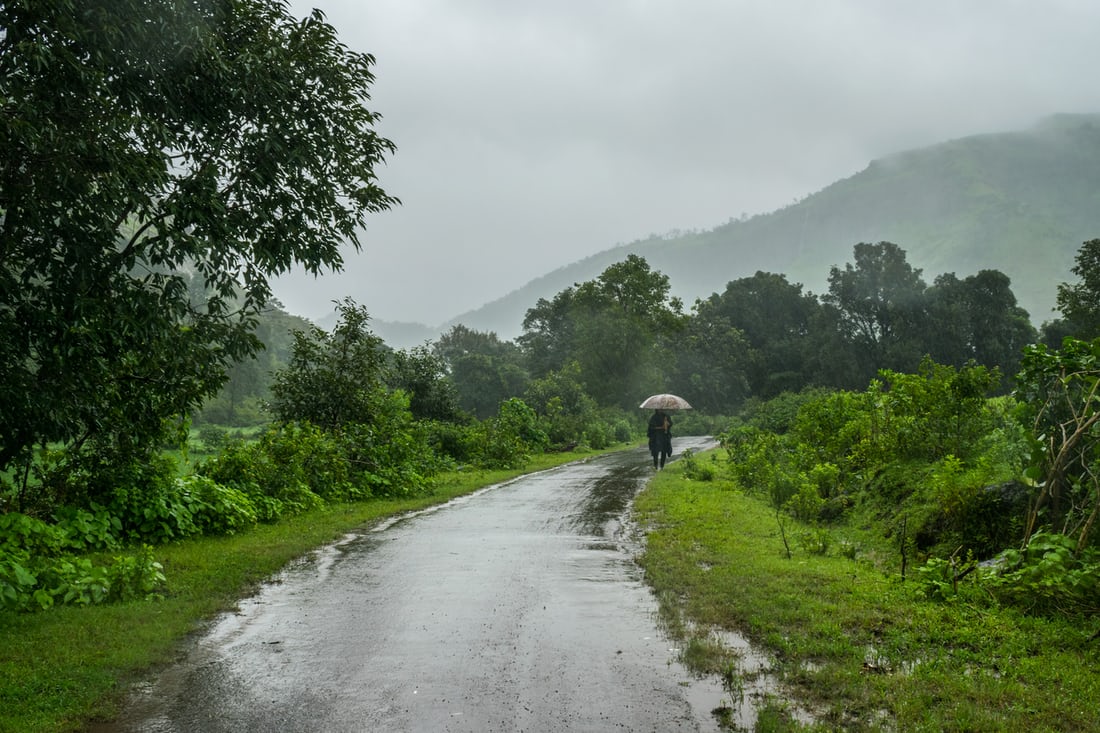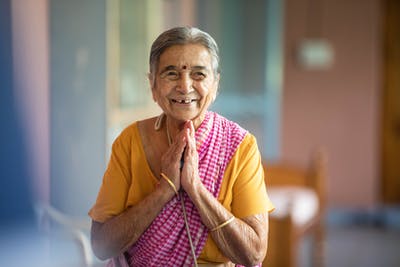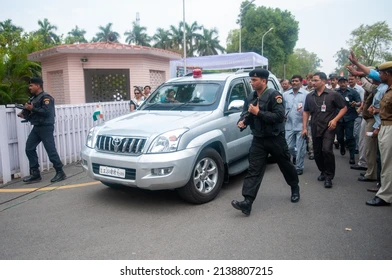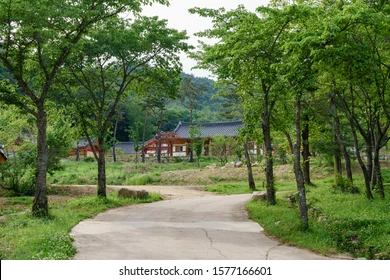
PART ONE

The predawn was evident only to those who looked for it. ‘JhunjuMunju’ according to the locals. A gradual lightening of the darkness in the east. Stars still dotted the sky, like little children reluctant to leave the playground. The only sound breaking the expectant hush was the mournful whistle of a freight train, winding its lonely way to some far- off destination. Busy, but alone. Rama Bai smiled to herself. She listened for that whistle each day. They were kindred spirits, the train and she. Busy hauling loads which benefited others more than themselves. To her ears, the whistle always seemed to carry a note of sympathy. A constant companion in a chameleon world.
She tried to ease herself into the familiar comfort of her morning rituals, but her wandering mind refused to obey. One phone call from a foreign phone-number was all that it had taken to for the dormant seed of hope to begin its sprouting in her robustly tired heart. Perhaps to be met with crushing disappointment. How many times had she seen it happen with the seeds she sowed on her lands? The good red earth, tilled and ready, a drenching few days of rain, the sowing and the hope. And then, nothing but the interminable wait for the rest of the nourishing showers, empty eyes turned to the gradually emptying sky as the clouds were driven away by a wayward wind, bent on mischief. Accompanied by a gradual shriveling of the hardy seed, as it gave up its futile efforts with an inward gasping sigh. The human heart was no different.
Her blood, it seemed had not thinned as much as she would have liked despite the daily dose of aspirin, thanks to her little ‘heart episode’, she thought wryly. It still answered the call of its own. Hope always sprang eternal whenever she heard from Raghav’s family.Anand would be angry when he heard about it. But if she had no choice, neither did he. Raghav had never been meant for them. He was like the sun, too big to be contained in a lamp. Meant to light everything by his brilliance. Belonging to everybody and yet, nobody.
He had left for school at the district headquarters at the age of eight, the village school-master insisting that he knew more than the teachers who taught at the taluka high school. From then on, there had been no looking back. A scholarship to Bangalore and then one to Germany. It had been something of a relief when he had finally settled in Hamburg. It had become increasingly difficult for her to pronounce the names of the various places where he had lived, when questioned by pesky relatives. Various branches of the clan had turned pea green with envy at his success. Fueled by sugary cups of tea well laced with gossip, the glee with which they spoke of Helga, the ‘foren- gori’, whom Raghav had married,were a mirror of their narrow minds, long conditioned byprovincial living which was the hall mark of rural Indiain the 60s and 70s.

Raghav insisted on visiting her every year. Helga had initially visited every three years or so. One of the happiest times had been when they had first brought Gautami along as a four-month baby. However, with the passing of Achyut Rao, the patriarch, her husband, there had been a gradual drifting apart. Two sons and two daughters, thought Rama Bai, but now, it felt as if the village folk were more her family. The recent pandemic had not helped. Travel bans, lockdowns, isolation, her aging eyes looked at everything with an equanimity born of need, but nurtured by desperate resilience.
With a start, she looked at the light creeping into her room. She seemed to be losing herself in her thoughts, more and more frequently.Now that dawn had broken, the garden which stretched behind the mansion, was a riot of pink and white, most of the rose bushes in full bloom. Her farmhands were already at work in the distant corner of the half acre garden, expertly plucking the roses with both hands, tossing them into baskets tied to their backs. They would be made into the Gulab Jal and Attar for which the tiny hamlet of Balewadi was famous. The scent of the attar had spread far and wide from her home to all over the district and then the state. She wished that it would mask the whiff of soured relations within the little world of her family.
PART TWO

Rama Bai’s life and soul now lay in her beloved garden and the thirty odd acres of farmland which lay just beyond. Red earth, clear streams and the deep blue of the sky. This had been her world for as long as she could remember. The Inamdars of Balewadi were an old family, having lived in this rural corner of Belagavi district of North Karnataka since the days of the Adil Shahi of Bijapur. Generations of them had farmed the land, the rich red of the earth perhaps leaching its color into their blood. They were one of the few families in the district whose lands had not dissipated due to dissolute generations. If anything, they had only added more acreage to it.
Rama Bai had been married into the family at sixteen. Since arriving as a young bride, dressed in the traditional nine- yard Paithani sari, from the neighboring village of Rayankot, she had known no other home. Seven decades had flown past. And now, though she was in her mid-eighties, even the mere idea of moving to Belagavi, the district headquarters had not crossed her strong mind. When her time came, she wanted her ashes to mingle with soil of her fields. She had decided thatred and gray, a novel combination which had worked very well for theKasuti embroidery of the women’s co-operative which she had established and led, should work for her too.
Ramakka, as she was popularly known in the village was a force to be reckoned with. She was the de facto matriarch of not just her clan, but of the entire village. Dressed in her cotton nine- yard sari, with a long- sleeved blouse, shod in Kolhapuri Chappals, her steel gray hair tied in a bun, she had only recently taken to carrying a wooden stick to help her on her peregrinations into her lands and beyond. The sharp brown eyes which glinted through the steel rimmed glasses, gave a glimpse into a deep, thoughtful and tenacious mind. A mind which feared nothing, from calling a spade a spade in family tiffs, settling the petty quarrels among her perpetually squabbling farmhands, to dealing with the rambunctious local politicians who were the ‘new elite’ and learning to adapt seamlessly to a huge house which gradually went from overflowing with people to a lonely emptiness. Hers was a life sans expectation.

Hers were also the heart and hands which helped in cash and in kind. Hers was the household which completely non critical, bore no one any grudge, where many a destitute loitering around the back-door could hope for a simple meal and a spare piece of cloth. In her younger days, she had been known to work shoulder to shoulder with the village women. Panchayats, headmen and government regimes had all come and gone like the falling rain. But Ramakka had weathered them all. Despite the twin scandals of one of her sons’ wedding a ‘Mem’, and one of her sons-in-law being a notorious drunk,thus being the constant butt of ridicule and speculation.
Her ‘Wada’ as the ancestral house was called had been modernized of late, complete with ensuite bathrooms, aircon and a modern kitchen, but her ‘majghar’ as the reception room was called still hosted the Ganapati for one and a half days in the month of Bhadrapad. Times had changed in the world beyond, but Ramakka remained what she had always been, a safe harbor for human ships sailing in the storm- tossed seas of life, a living memory of a gentler era, a person who still lived by ‘the old code’.
PART THREE

Tamipushed back the blue fringe of hair from her eyes before settling her sunglasses on them. Boy, was she dying for a smoke! Blast these Indian airports, which changed the luggage carousels at the drop of a hat. She had just managed to leg it to Belt Ten from Belt Two at the other end of the arrival hall, and could feel the rivulets of sweat trickling down her neck to her back. The thin vest top was already clinging to her lithe form. She sensed, rather than saw people leering, something she was used to.
Five feet six inches of litheness, choppy deep auburn hair with a bright blue fringe, startlingly vibrant green eyes, milky skin with a dusting of freckles on the high cheek bones, dressed in a cream vest and teeny belted shorts, a denim jacket hanging carelessly off one shoulder, she tried to fight her way through the throng clustered around the carousel which had jerked to life and was disgorging bags with irregular clangs. With a single disgusted backward glance, she brought down the three- inch heel of her black knee -high boot on the foot attached to the same torso, whose large hammy hand had been trying to land on her shoulder or perhaps further down, causing a muffled yelp as the would-be molester staggered away as quickly as possible, giving her a convenient spot next to the carousel.
Smiling grimly, she started to scan the bags. She needed her green suitcase. The basic outline of her paper and the approval letter for a case study in the Indian rural community of Balewadi, which she had wrangled after interminable correspondence with the Indian Embassy in Germany, were tucked safely in her ruck sack.But the suitcase carried various other paraphernalia like her video recorder, translator and Dictaphone. The Gods must have been looking out for her,for her suitcase arrived in record time.

Heading out of the terminal, the muggy heat of the Mumbai night hit her like a physical force. Eyes scanning the chauffeurs clustering around the barriers, she lit her cigarette and inhaled deeply, allowing the smoke to pervade her lungs. With a wry twist to her mouth, she knew that she needed the smoke to keep her going in the humid stench of sweat which was making her gag. That was when she spotted him, a mouse of a man, bearing a tattered piece of cardboard with GotamiImnadar scrawled on it in black marker pen.
Tami gave an inward cheer at being vindicated. Talking to Dad about her aunt Mandakini’s mean mindedness had been like talking to a brick wall. Her aunt’s snide remarks about her dressing sense, her manners and her morals had almost made her flee home when shehad visited Hamburg three years ago, amid much fan-fare. She had been the only one of Dad’s family who had come to visit them. Well, thought Tami sardonically, if the rest of the clan were anything like her self- righteous aunt, they were better off staying in India. “Just look at the guy who has come to pick me up!”, she thought. “Looks like he needs help with the suitcase”.
What she did not know was that her aunt had sent her most trusted chauffeur to pick her niece up. She would have come herself, but having fallen in the bathroom a couple of days ago, she had suffered a severe sprain to her ankle and had been advised to rest the limb for at least ten days. Mandakini was a widow, and her twin daughters who were married, lived in Hyderabad and Bangalore. She was devoted to Raghav and wished that she had been more open minded when she visited Hamburg. But, being a conservative person, she was afraid that she had come across as a crochety, judgmental crone to her niece. She regretted looking at the girl, who, to all intents and purposes was German, through an Indian lens and a myopic one at that, and wanted to make amends.
As Manohar drove off smoothly with Tami safely in the back-seat after he had wrestled her giant bag into the boot with surprising ease, Tami leaned back and allowed herself to drift with the smoke rings from her cigarette. It had all been because of a bad grade in a single subject, Human Rights and Gender Studies,that had been her undoing and made her traipse all the way to India. Oh yes, her roots were half-Indian, but she could no longer relate to them. All that remained were half forgotten memories of childhood visits, and the weekly phone calls to her grand-mother which Dad had made her participate in until she left home for university. She had never really felt a sense of belonging or familiarity, though. While Dad’s tales of growing up in the village had initially carried a certain charm, they later seemed provincial, prejudiced and suffocating. Brought up in the now described as ‘woke’ environment, Tami had been gradually distancing herself from the Indian part of her legacy. Her shortened name was proof enough.

She had initially wanted to complete her graduate paper in one of the Scandi countries, Denmark being her first choice. But a bit too much of horsing around, with the pandemic following swiftly on its heels had put paid to her plans. Professor Hahn had none of the customary twinkle in her eyes when she addressed her brilliant but falling-behind-the-times student, with an alien sternness. Her paper HAD to be unusual and only then would she be allowed to keep her place in the current program. The unsaid ‘or else’ had a sinister undertone. It would mean dropping out of the master’s program indefinitely until another place became available. “So not an option”, thought Tami grimly. Dad would never say “I told you so”, he was much too gentlemanly and too fond of her for that, but she would fall short of her own expectations. And that mattered a lot. And thus, this trip.
What better place than India to study gender and social differences with its deeply entrenched caste system and rampant inequality? And given the current regime with its strange notions of nationality based on an ancient religion of all things, this paper would be a breeze. She knew she would return triumphant in a couple of months, with all the necessary images of inequality which kept the aspirational East in its place and championed the cause of freedom so beloved by the West, which was still hung over on colonialism.And then, Professor Hahn would send a recommendation to Cambridge. That was where she had wanted to be her entire life. Well, she would write the best paper she could on the murky underbelly of an aspirational society. What better setting than a village where her mother had been laughed at and called names for wearing pants?
As the car drove up to the surprisingly beautiful and lush environs of her aunt’s gated community, Tami decided to stub out the half-smoked cigarette which she had lit only minutes before. She hated groveling, but as of now, discretion was definitely the better part of valor. Her aunt was the only person whom she felt she knew vaguely. Her grand-mother was a hazy memory at worst and a disembodied voice at best. She needed someone who could show her the ropes as she tried to complete her paper in record time. She had no intention of staying in this god-forsaken country, especially in the back of beyond for even a single minute more than absolutely necessary.
As she travelled up in the lift which led to her aunt’s penthouse, she felt a little shiver of some unknown emotion. Too many gaps, generational, behavioral and cultural, separated her and her foreign upbringing from half her roots.
PART FOUR

Ramakka half- heartedly supervised the women who were soaking the rose petals in cold water. Normally, she would have picked random samples of flowers from the heaps scattered around, peered beadily at the sorted roses to make sure that no pests lurked anywhere and tested the temperature of the large vats of water in which the flowers were to be soaked. Ever since her perfumery had been granted the ‘Inamdar Attar’ trademark, she had gone great lengths to ensure that the perfumes of her making were always of the highest possible standards.
Before the advent of the pandemic, she had been toying with the idea of patenting her perfume-making and packaging process with Raghav’s help. He was a great one for innovations and would have ensured that her special techniques and the secret ingredient which she added to the vats before distillation were recognized far and wide. Well, if that was not to be, she would be satisfied with her trademark status. It was not of any particular importance to her, but helped the women whom she employed, as the ‘branded’ perfume fetched more revenue and made their lives that much easier. It meant the higher education of a child for one, a much -needed surgery on a husband for a second, and a way to repair the sagging house for yet some-one else.
But today, everyone could sense the tension in the atmosphere. A few of the women wondered about it. They had heard that GautamiAkka, the daughter of Raghav Anna and the ‘Mem’was coming to stay for a few weeks. Surely, it was a time to rejoice? Ramakka should have been in the kitchen, preparing her famous ‘holgi’ or ‘puran-poli’ (flat bread with a delectable Bengal-gram and jaggery stuffing) instead of pottering nervously among them. They sensed that their beloved matriarch was worried about something, but knew better than to ask.Ramakka might have been beloved by all, but she knew how to set boundaries, which seemingly non-existent to a novice at first glance were only too apparent to those who had worked with her for years.They decided to bide their time until the much- awaited visitor arrived.
Tami sat hunched in the front seat of the Nexon. The mid-morning flight from Mumbai had been brief and pleasant, but things had been going steadily downhill, ever since she landed at Sambra Airport, to be met by her Uncle Anand. If she thought her Aunt Mandakini to be a typical orthodox, provincial Indian, Uncle Anand took it to a whole different level. Clad in a loose Kurta and Pajama, he sported what looked like three horizontal lines of white ash on his forehead. Around his neck, hung several necklaces, made of something resembling shriveled brown seeds,as well as a long length of yarn, folded several times on itself. Hairy toes peeped out of thick brown sandals. To make up for his balding head, he sported a bushy mustache and a thick beard, both sprinkled liberally with gray. He gave off hostile vibes like other people did after-shave.

Grunting in response to her wary greeting, he led her to the parking lot and gestured her towards the car. As they slid out smoothly,Tami peered around her, partly in surprise and partly in disdain. Hitting a spot of bad traffic at the exit leading to the highway brought about what seemed like a fluent stream of cursing from her dour uncle. For once, the normally flippant and irreverent Tami was at a loss for words. Dad had certainly not been exaggerating when he had described his brother as ‘different’.
She had dressed rather conservatively today, a half -sleeved linen shirt in pale green, loose black linen pants and loafers. The blue fringe was the only reminder of the hip young thing who had arrived in Mumbai yesterday. Perhaps it was because she was meeting her grand-mother after a long time, perhaps because she had to win the co-operation of these people, or perhaps because she did not want to hurt her father’s still-Indian sensibilities.
Her good resolutions were severely put to the test during the drive to her grand-mother’s home. Her uncle offered nothing by way of conversation and her attempts had been rebuffed either by a frown, or the now familiar grunting. She sighed and closed her eyes. Two could play at this game, she decided. If her uncle could go without conversation for a couple of hours, she could easily go a couple of weeks. She could make him her first case study in Indian Misogyny. Thanking God that she wouldn’t have to suffer his company for long, she leant her long frame back in the seat and gave in to black thoughts.
Why did these people have to be so judgmental when it came to dress, habits and behavior? What freedom existed in society if everyone was expected to follow strict norms? What would her grandmother have to say about her? Would she freak out if she ever heard of Michael with whom she had been in an on-off relationship since the last three years? And most importantly, how on earth was she going to smoke or down the occasional bottle of beer which kept her going on a hot summer evening? These few weeks at her grandmothers were going to test her resilience more than any of her beloved endurance hikes in the Alps ever had.
She opened her eyes with a start to the sound of tires screeching over gravel and the sudden slamming of brakes. They had drawn up in front of a two- story building with a small front garden comprising of a few rose and holy basil bushes, with a swing in a corner. Three stone steps led up to a heavy wooden door studded with menacing looking spikes. Built entirely of grayish-black stone, the front had tiny slits of windows. A balcony ran around the entire upper story,roofed with red tiles. Two tall May-flower trees stood like sentinels at either end.
But Tami’s attention was riveted on the small, squat figure clad in a traditional sari, who stood on the top step,her face a mixture of emotions: love, hope, joy and a bit of wariness. She had finally arrived. Where? She wondered cynically. Not home, definitely. But at least where she traced half of her ancestry to.
PART FIVE

Tami walked sullenly along the narrow path which led into the fields lying beyond the stream. A crude stone bridge was built across the thin trickle of muddy brown water which navigated the sandbanks with difficulty. She could sympathize, she thought, as she gazed at the sluggish rivulet moodily. Her struggles to get ahead seemed reflected by the water. A lot of effort, but not much headway.
Chucking a pebble into the rivulet, she reflected on the week ‘that hadn’t been’, to her liking at all. With almost no progress to show on her paper, she wondered whether her decision had been wrong after all. Her first and most important limitation, had of course been language. If her heavily accented English did not do much for her cause, the smattering of Marathi which she picked up from Dad and which she had desperately tried to polish, did even less. It was difficult to communicate with her grand-mother, let alone the other women.
‘Aaji’ as the old lady had insisted, she be called, could thankfully speak in English. It was the type of prim and proper English that was probably spoken in Victorian England, but that was how Ramakka had been taught by her Anglo-Indian governess, making her an object of curiosity inRayankot, the village where she was born. Ramakka’s progressive uncle, who had been a revolutionary of sorts had made sure that his niece was as well- educated as his sons, at least until she finished her ‘matriculation’, before Ramakka’smother put her foot down and insisted on matrimony. And thus, Ramakka was proficient in reading and writing English, if a tad old-fashioned and rusty while speaking it.
Aaji had been only too happy to set up interviews with the women who worked with her in her small cottage industry of producing perfume or ‘attar’ from roses. She had even explained the complexities of the ‘village co-operative’ that she had formed, which helped the women supplement the otherwise meagre incomes which their families earned. Tami had been given chapter and verse on the finer nuances of ‘attar’ making and even been introduced to the art of ‘kasuti’, the famous embroidery of North Karnataka, which was another of her grandmother’s pet projects. This art fascinated Tami, the vibrant colors, the intricate designs and the dexterity of the women as their needles flashed in and out. It was more than art: it was a sort of meditation.
It was not the apparent lack of communication nor the cultural and generational gaps, thought Tami to herself. It was the element of surprise which had taken her unawares. She had expected a village of docile women, working quietly in the fields or on her grandmother’s lands, subservient to the men, victimized to a large extent. She had frankly expected to find a case of domestic violence here, some dowry harassment there, or a woman abandoned by a philandering husband at the very least, within the first few hours of her arrival.
What she had not expected was a thriving community in which the women ruled the roost and looked up to a matriarch, Ramakka. For the past few days, Tami had seen them walk in confidently in the morning, chattering about everything under the sun, clad in clothing which could be described as eclectic at best, from nine-yard sarees to salwar -kurtas and jeans! During the afternoon lunch breaks, the animated conversations became truly informative and entertaining, ranging from the popular movie of the week, coaching classes for children, the benefits of the new saving schemes introduced for the girl child, politics, and the best way to thwack a man backonto the teetotaler wagonif he showed any signs of falling off.

The village had a male headman, a ‘Sarpanch’ as he was called, but ironically, he was often to be found sitting abjectly in Ramakka’s verandah, seeking advice for some issues in the village, wandering cattle, petty quarrels over the use of the water from the tank and the like. Tami had been taken aback by the sheer respect her grandmother commanded. A niggling doubt whether the status of women in rural India was really as unequal as was touted in the West began to gnaw at the back of her mind.When she had arrived, she was sure that she would quickly write on the rampant discrepancies existing in rural Indian communities, especially based on gender and caste. But now, she could no longer trust herself to do it. Professor Hahn had hinted that anything which highlighted human right infringement in the Indian setup would be lauded and a spot for a doctoral thesis at Cambridge would be hers for the taking.
What was it then which stood between her and ambition? Tami had tried for long to deny the unexpected kinship she strangely felt with the village in general and her grandmother in particular, which until now had prevented her from fudging any data or falsifying information. She also realized that Aaji held such sway over the hearts of her people, that she,Tami, would have been summarily chased from the village by the disgruntled villagers should they get even a whiff of her intentions to show their matriarch or her beloved village in bad light. AuntMandakini had warned her as much. Ergo, her irritability.
Perhaps, she needed to approach the problem from another angle. There was sure to be a discrepancy in the wages that the men and women were paid. This had been a norm since the Industrial Revolution and even women in the West had begun breaking the glass ceiling only recently. Surely, she could dig out some data there? Oh, and she had completely forgotten the caste issue, which would definitely surface in a small rural community. She would be sure to find a lower caste family who had had to settle at the fringes of the village and was perhaps ostracized by the upper castes. She could write about this and calm her disquiet. Eating her cake and having it too! Feeling more cheerful at this prospect, she walked on towards the sea of waving green fronds of millets which were the main crop growing in her grandmother’s lands.
She stopped short as she saw her grandmother standing still amid the waving crops. Was it her imagination or did she appear slightly stooped and more wizened than just a few days ago? As Tami watched, she was shocked to see Ramakka’s shoulders heaving in what seemed unmistakably like sobs. She felt a creeping sense of shame for spying on what was probably a private moment for her grandmother and for what she was supposed to do. For a moment, she felt torn between wanting to rush forward and put a comforting arm around the shaking shoulders and staying quite still where she was, half-hidden in the greenery.
Almost as if sensing her presence, Ramakka squared her shoulders, turned imperiously and beckoned her forward. She pointed into the distance with her walking stick, “See all that land, right up to the small hill beyond? Well, it’s ours. Yours too, since you are a part of Raghav who is a part of all this, whether he likes it or not”. Tami nodded. Perhaps it was because she had just seen Ramakka at her most vulnerable, just a few moments ago that she added, “Dad misses you more than he cares to acknowledge. But you must understand, his work in physics is his life. He tries to bridge both his worlds, but it is not always easy. Mom and I don’t really understand your….I mean these ways, we are not used to it. It is not that we don’t mean to visit or keep in touch, but it is difficult. Dealing with a group of people who look at us as ‘different’, make us feel different.”
Ramakka listened without interruption. “Raghav probably felt like this too, you know,” she said quietly, making the blood rush to Tami’s cheeks. She suddenly realized that she had never asked Dad about whether he had felt out of place when he first arrived in Germany, or still did. She had just assumed that he had been happy to escape the third world, and had taken to a better country, like a fish to water. She remembered the wistfulness in his voice when he told her about his childhood and the hopeful look in his eyes whenever she spoke to her grandmother in her broken Marathi. She remembered the times when he sat in his study in the dark, listening to Indian folk songs and the way his eyes gleamed when they dined with Indian friends.
Ramakka reached up and patted the fair cheek tentatively, with her soft, wizened hand. Her brash, devil-may-care granddaughter had inherited a part of her sensitive Raghav, after all. “Allhumans under the skin, want the same thing, acceptance and cherishing,”she thought to herself. “We all have to follow our paths. Follow them sincerely, and we will definitely get to where we intend to go. And if you do meet a way-farer trudging along, make sure to lighten his load without any expectations,if you can. It is what I have always tried to do. It keeps you happy”, she said. As they walked down the path together, Tami felt a rise in her spirits after ages. Had they both begun to build bridges? She was amazed at the sudden feeling of kinship she felt with this woman who had been all but a stranger until a few days ago. She toyed with the idea of disclosing her real agenda of unearthing inequality and what she was supposed to say in her paper to her grandmother.
Deciding against it at the moment, she resolved to enjoy this newfound bond for another few days before disclosing the truth, which her grandmother was sure to find unpalatable. Had the slower pace and the simple life begun to affect her too? She did not feel the need to gulp down her daily dose of cigarettes anymore, and only smoked one on occasion. And as for guzzling beer, the large pot of purplish pink ‘sol-kadhi’ (a cooler of kokum fruit and coconut milk spiced up with zingy green chilis and a garlic pod) seemed like a much better idea. ‘Sol Kadhi’, indeed! Well, the name was appropriate for it seemed to have made inroads into her soul.
As the two of them made their way home in companionable silence, Tami’s heart sank at the familiar sight of the white Nexon parked near the house. Uncle Anand was back.
PART SIX

Tami’s eyes popped open all by themselves. A glance at her cell-phone showed that it was only five thirty in the morning. Of late, she had been waking up earlier and earlier. When in India, do as the Indians do, she thought wryly. Back home, mid-March meant just a slight lessening in the chill winds blowing off the North Sea. As for waking up this early and throwing off the bed-clothes? Forget it! She would have been huddled safely under the heavy down comforter before hitting the snooze button a dozen times. She was amazed at how quickly this place had started to feel like home. The food, the people, the colors, how in the world had they wormed their way into her heart? It was as if her blood answered the call of its own, of the soil. Or was she as fickle as water? Ready to change course at the slightest obstruction?
Jumping out of bed which was curtained by a gossamer light mosquito curtain, another quaint addition which she loved, she walked to the tall narrow window and flung open the rest of the heavy wooden shutter before leaning out over the carved balustrade. She loved the extensive use of wood in this old house. It reminded her of the cozy cottage in the Alps where she had spent quite a few summer holidays with her parents.
A couple of strident voices cut across the morning calm, instantly shattering the tranquility. Uncle Anand again! She was vexed. The man was like a charging bull, strewing mayhem all around, wherever he happened to be. Aaji came into view, back ramrod straight, gesturing angrily with her walking stick. She seemed to be giving her son a piece of her strong mind and he was in no mood to back off. For the hundredth time, Tami wished she had paid more attention to Dad’s Marathi lessons. This was uncle Anand’s fourth visit since her arrival, and the most acrimonious yet.
Tami wished that her grandmother would confide in her. But she was not naïve. A rift of many years could not be healed in a few days. She really could not expect her grandmother to tell her everything, when she herself had been the true Teuton, off-putting and taciturn initially. Aajiwas as proud as they come, and as independent as a cat. Tami instinctively knew that she would not tell her the cause of the constant altercations, for she recognized the intensely private nature of her grandmother’s thoughts. They were a reflection of her own. She had observed a pattern with Uncle Anand, though. He generally arrived in the evening, went into a huddle with Aaji with some account books in the study after dinner, slept soundly till dawn and left after a lot of acrimony the following morning, having partaken of a huge breakfast.
Dad had told her that he lived in Belagavi, the district headquarters, with his wife who was the principal of a local school. His only child, a son, was a major in the Indian Army and was currently posted in Guwahati, a city in the north-eastern state of Assam. He managed the sales and marketing of all ofAaji’s agricultural initiatives and had made a tidy profit over the years. If the pictures in the drawing room were to be believed, his home was a mansion, with gleaming marble, floor- to-ceiling windows and an infinity pool which could have graced the rooftop of any five- star hotel. Why was he in a perpetual snit, though? Tami sighed. It was another of those unfathomable family mysteries.

Not that she had much time for all this, because it wasslowly and surely running out for her. Another couple of weeks and if her paper was not submitted, it would meanquitting the university. It was time to come clean to her grandmother, and if her theme was impossible here, it was time to up sticks and move on. There had been a vague email from Cambridge and she was still trying to fathom whether it was an offer or not. But she knew that this was certainly the end of a road. Even such vague offers may not be in the offing if she did not show willing and completed the paper exactly as they wanted it.
Perhaps she would never be able to establish the deep rapport she would have liked with Aaji, but her career was paramount. As she wandered aimlessly around the room, staring at the photos dotting the walls with unseeing eyes, her hand straying into her pocket for a cigarette to calm her frayed nerves, she was brought up short by a hand on her shoulder. Aajiagain! For a woman with such a commanding presence, the dear lady definitely had a way of creeping up and catching people unawares. It was time for breakfast.
The first thing mused Tami, as she took her seat, which had struck her about her grandmother was that everything about her was real, really, really real, without even a smidgen of artifice. The way she walked, talked, worked, dressed, even her admonishments were genuine and without guile or ulterior motive. She was a hard taskmaster, ruled everything with an iron fist and could be maddeningly pig-headed and dominant. But what you saw, was what you got. It was a welcome change for Tami, who dwelt mostly in a world of smoke and mirrors. Ever since she had moved to the University of Berlin, her life had changed beyond recognition. The constant exposure to overwhelming ambition, the unrelenting pace, the false facades everywhere and the need to get ahead at any cost, had begun to make a cynic of her. While meeting her grandmother had seemed like the last nail in the coffin of her woes at first, Aaji’s surprisingly liberal attitude and the way she had accepted her unquestioningly made Tami question the validity of thinking her judgmental, when she, Tami had been viewing everything with a prejudiced eye, conveniently covered up by the excuse of ‘a clash of cultures’.
Uncle Anand grumbled non-stop throughout what Tami thought was a rather trying meal and left soon after. Tami decided to go for one of her long walks to clear her head and decide whether today was the day to come clean to her grandmother.
PART SEVEN

Ramakka sat in her study, engrossed in her pile of mail. It was the usual stuff, things related to the perfumery, orders for the attar, seed and fertilizer catalogues, swatches of fabric for the Kasuti embroidery. One envelope however, stood out. It bore British stamps, was marked ‘Urgent’ and addressed to her. Who on earth could be writing to her from Great Britain of all places? she wondered as she deftly slit open the envelope with her ivory letter opener. She had swiftly scanned half of it, before realizing that the it was merely misaddressed and not meant for her after all. Hastily, she put it back, feeling guilty about getting a gist of the contents. She would give it to Tami as soon as she returned from her jaunt.
She glanced at the large framed photograph of her uncle on the study table. What would he feel if he knew that the freedom which had been his mission in life, and which he thought the country had won was being whittled away little by little? A wry smile played on her lips. Back in her youth, the struggle was clearly divided into white and black, literally. But now, though the players remained the same, the opponents had become experts at disambiguation. They now turned the children of India against their own. Well, this one, was more of a moral struggle, in which she could not participate. Her granddaughter would have to decide on her own.
Tami returned to the remarkable sight of a large SUV sporting a large red beacon on its roof, an Indian flag fluttering on the bonnet and official looking number-plates,as well as a jeep marked ‘Police’ parked in front of the house,with what looked like a couple of policemen on duty outside. What on earth was going on? Who was Aaji entertaining now? She crept in as quietly as possible, meaning to quickly check if all was well, before making herself scarce. She had finally succeeded in laying her devils to rest. Her ambition had triumphed and she decided to emphasize the woes of thefew disgruntled workers who claimed to get less wages, whom she had serendipitously managed to unearth, out of Aaji’s large workforce, that very morning.
Well, she had the basis for her paper. All that remained was to get the interviews and videos and write it up. She still felt torn, but strangely calm as well. Perhaps, she had gotten too emotionally involved in her roots. She had to grow, reach for the sky and if it meant transplanting herself and adapting to a new soil, so be it. This sojourn in India would remain what it was supposed to be, a happy memory of ‘living differently’. She really could not expect her grandmother, sixty-five years older than her, to become her best friend and understand her life.
The quiet murmuring from the drawing room suddenly escalated into loud voices, making her shudder. This, she reminded herself was the reason she needed to go back home. This kind of temperamental see-saw and in-your-face loudness on a daily basis, was too alien for her. Drawn to the fracas despite herself, she surreptitiously peeped in, to see a strange sight. A dark well-dressed woman, clutching her grandmother’s feet in a clear gesture of impassioned entreaty, while her grandmother attempted to soothe her and free herself at the same time. Alerted by her presence, the woman abruptly got to her feet.
Tami was astonished when she addressed her, “You must be Raghav’s daughter. All grown-up, I see. I am ShevantaDomban, the divisional commissioner of Belagavi division. The state government is launching a new training school for weavers at the taluka headquarters. We are all of the opinion that it will be a great privilege to have Ramakka inaugurate it. Can you manage to convince her? I have been trying for the past half an hour, but no amount of entreaty has worked so far. If you pull it off, we will be eternally grateful!” Tami stared in open-mouthed astonishment as the woman, who was clearly a powerful bureaucrat, touched her grandmother’s feet again before departing in a flurry of much saluting and bowing and scraping on the part of the policemen stationed outside the door.

The more she lived with her grandmother, the less she seemed to know her thought Tami. Who was her grandmother exactly? A reformist? A do-gooder? A humanitarian? Or an ordinary human, unnecessarily catapulted to a greatness which she did not deserve? Her thoughts were plagued by the image of the three laborers who had accosted her that morning, claiming that they had not been paid for the past two weeks because they belonged to lower castes. Should she ask her grandmother about them? Looking around, she saw that her grandmother had glided out of the room on silent feet, leaving her feeling more alone than before.
Ramakka had summoned Tami to her study. The girl had not set foot into this room ever since she had arrived. Not that Ramakka had expressly forbidden her to enter, but somehow, the occasion had never arisen. Ramakka had been quite preoccupied, first with the problem with a few of her laborers, then with Tami’s advent and then the situation with Anand, and Tami had never voluntarily sought to meet her there. All their interactions had been in the gardens and fields, in the kitchen and the perfumery, and in the drawing rooms and bedrooms. Never the study, which was still a private sanctuary for Ramakka.
When Tami entered, Ramakka noted that the sullen look which had gradually been fading was now back in Tami’s eyes. Heaving an inward sigh, she wondered what had gone wrong. She had been overjoyed with the gradual development of what seemed a genuine bond between her and this unknown, but well-loved granddaughter of hers. If there was a thing which Ramakka prided herself on, it was the bond she shared with her grandchildren, if not all her children. Tami had been the only one missing from the fold and when she had joined in, Ramakka had felt the satisfaction of a life well-lived.
But something had soured that morning. The arrival of the letter had made Ramakka muse about the futility of expecting Tami to accepther enough to confide in her. Wordlessly, she reached into her drawer and handed her the letter. “I opened it because it was wrongly addressed to me. My apologies”, if her formal tone surprised Tami, she did not let it show. It was the coveted letter from Cambridge, mentioning a place for a doctorate.So, Professor Hahn had sent the recommendation after all. But the condition which Professor Hahn had only mentioned, was put forth in rigid black-and-white. Nothing less than a paper on serious human rights infringement in India would suffice. It was signed by Dr. Ashok Sen, renowned the world over for championing the cause of the downtrodden in general, but those in India in particular. He was a much- touted professor of ‘Sociology in the Indian Culture’ and had written several papers on human rights infringement in India, many of which were controversial at best and suspect at worst.
Tami initially wilted under her grandmother’s steady unrelenting gaze. Aaji was no fool, and she must have understood why Tami had arrived here in the first place. Did she feel an overwhelming sense of betrayal? Or had she known from the start that Tami would never fully belong? That she must have had a sort of hidden agenda of her own? But really did it matter that much? Several Indians had done much worse. But if the true nature of Tami’s paper became public, what would happen to the Ramakka’s good name and the position she had built over all these years? As a social worker, as a person dedicated to the upliftment of her community, and as a patriotic Indian?
PART EIGHT

Tami stared back at her grandmother, unrepentantly. She knew what she had to do. Her grandmother could pose as much as she liked, but today Tami had discovered her feet of clay. Ramakka sighed. She had tried her best to keep Tami out of the politics which was now an integral part of any social upliftment program which was implemented in the village.
“If you want a position in Cambridge, you will have to meet their demands. You might wonder how I know so much about this, but I try to keep up with the latest in the field of education. Ever since Raghav went abroad, I have tried to know the latest and best fields to study and the best colleges too. Today, I am a successful businesswoman and agriculturist and able to try and help those who are less privileged because of my uncle’s vision. If he would not have given me an education, I might have sold out after your grandfather’s passing and would have been just another senior citizen, whiling away her time, till time itself claimed her.”
“Do what you think is the best for your career. Write your paper. While I have tried to better the lot of my village, it may not be the case elsewhere. But I wish you would take into account that ours is a large, unwieldy nation which was in tatters for several years even after independence. That we have fought frank and proxy wars. That we are trying to correct the wrongs which exist in our society and that it is not an overnight process. I am sorry you feel like you don’t belong. I have tried to bridge the generation gap between you and me, but it is too wide for both of us, perhaps. Let this stay of yours remain a wonderful memory for the both of us. And, don’t feel guilty about choosing your path. I am glad we could knit at least a small gossamer thread of Kasuti between our hearts, if not more!” Ramakka stood up, indicating the conversation was over and swiftly left the room, leaving Tami more confused than ever.
Her wandering footsteps led her to the cooperative, where she knew the women would be at work with their Kasuti embroidery. The rhythm of their working and the repetitive action of the needle flashing in and out of the thread would probably soothe her. The finished design with its subtly elegant flamboyance, such a contrast! never ceased to amaze her.

When she went in however, she immediatelyfelt the lack of the usual camaraderie on the part of the women. Normally, they would try to crowd around, show her their designs and generally bask in ‘Akka’s’ approval. Today, they were dour and disapproving. Her arrival was met with nudges, surreptitious glances and frowns. With no one ready to address her, Tami wondered if they had somehow picked up on what she planned to write about their village, but quickly banished the thought. How could they know? Unless…Aaji had told them? Was she such an underhand person? Tami was surprised at the sudden swell of hurt within her.
As she turned to leave, she saw another figure lurking by the door.The bureaucrat was back again! Hadn’t she left ages ago? Why was she back? She was even more flummoxed when the lady addressed her, “Yes, I am back. Because, these women wanted to meet me. I am a daughter of this village too. Apparently, a few men abetted by a few unsavory elements have been trying to create trouble for the cooperative and for Ramakka. Threatening her with dire consequences if they are not paid more wages than their wives. I think these women saw them talking to you this morning. Kalappa, Doddanna and Kadir, am I right?”
Tami nodded. Shevanta continued, “Their wives Gauramma, Dakshayani and Sakina,” she paused to point out three women in the crowd, “believe that they are stirring up trouble. They accosted you about their pay, didn’t they?” without waiting for Tami’s reply, she barged on, “They are infamous for their notorious ways, drinking,womanizing and indulging in petty crime. That is why, Ramakka refuses to hand over their wages to them and gives them to their wives instead. Did you really think that she would discriminate on the basis of caste?”
Her harsh voice rang in Tami’s ears, but the woman was not done yet. “There is something else I have to tell you,”. Leading Tami outside, she continued, “My mother was a ‘Tamasgir’, a dancer of ill-repute in travelling shows, a glorified prostitute, if you will. I never knew my father. My mother died in this village, when the show was performing here for about a fortnight, when I was ten. I would have had no other option but to follow in my mother’s footsteps, if not for Ramakka. She found out about me through one of her servants, who frequented the show. I don’t know how she did it, but she brought me here, away from the hopeless life which I had resigned myself too. Her pretext was to hire me to work as a maid,but she enrolled me in and encouraged me to go to school.”
“When she realized that I was bright, she sent me to the high school at the taluka headquarters. I was in Anand’s class. Both of us appeared for the high school scholarship exam together. There was just the one spot for the whole taluka and I beat him by just one mark. But, because he was the son of a rich landowner, the headmaster thought of awarding it to him by fudging the marks and came to meet your grandparents. When Ramakka heard of what he wanted to do, she was livid. He tried to explain that I could apply under the backward caste category, but she would have none of it. I had won it fair and square and it was right fully mine, she said. Anand had to go without it.”
“Anand’s disappointment knew no bounds. He had boasted aboutwinning the scholarship much in advance. The ridicule he faced at school scarred him so much that he gradually lost interest in studying. He never did as well as he could have. Having to settle with a mediocre degree from a mediocre college, he started to see this single episode as the beginning of his downfall. As it is, Raghav’s obvious brilliance meant that he was always second-best in his own family, in his own mind.” She smiled ruefully. “News travels quickly here. Nothing stays secret for long. I have heard that though he does all that he can for his mother, he still rakes up the lost scholarship on every visit and quarrels with her about it, even after all these years. You have probably witnessed it.”
She stepped forward and placed her hand on Tami’s shoulder. “I came to tell you all this, because you are clearly out of your depth. You have no experience in the politics of this village, making you an ideal pawn for certain disgruntled, unscrupulous people who want to get back at Ramakka through you, by swindling you for money with their sob-stories,or by provoking you into arguing with Ramakka on their behalf, causing unnecessary misunderstandings between you and her. It would push Ramakka deeper into her personal pool of loneliness, where she has lived for so many years now. And I don’t want that, because this is the first time in a long time, after Raghav’s departure, that I have seen her so happy, as if a void deep within her is being gradually filled”.
“A woman who can do so much for an unknown girl of doubtful lineage, who can stand the censure of society and her own family in her fight for justice cannot be the flagbearer of inequality and discrimination, can she?” A swift smile, and she left as quickly as she had come. Staring after her, Tami’s fickle, wavering mind finally knew what it had to do.
EPILOGUE

The good employees of Parfumerie Fragonard in Grasse, France were too polite to stare, but the pretty young twenty something in the chic gray shirt with the unusual red thread work, and the stately eighty something in Mon Dieu, was it a sari? were the most unusual visitors they had had in a long time. To his credit, the chief perfumer answered all their questions patiently. He was particularly taken by the old lady and the depth of her knowledge in the subject. Perhaps she distilled perfumes too?Their numerous questions satisfied at last, the duo stepped outside into the bracing autumn wind.
Rubbing her hands in unmistakable glee, Ramakka looked at Tami with a wicked glint in her eye, “Now that we have tackled the perfumery question, I wonder whether we should venture into the winery business too?”, she asked saucily, head cocked to one side. A wide grin lit up Tami’s face.

Later, as Tami gazed up at the star -lit sky from the little balcony of the hotel room which she shared with Aaji, she felt more content than she had felt in a long time. The decision of getting another degree in applied ecology and agriculture had been the best decision of her life. Life was too large and paradoxically too short to be hemmed in by narrow conventions and prejudices, she decided.
As she caressed the delicate kasuti embroidery of her tunic dress, she felt the weave grow strong under her finger-tips, weaving a bridge across generations and helping her straddle both her legacies. She felt a soft hand caressing her cheek in a now familiar gesture. As she met her Aaji’s eyes with a new understanding, she knew that they had both followed the road to each other’s hearts, the long road home….

2 replies on “The Long Road Home”
Waiting eagerly for the rest!!!
Wow….too good…I’m waiting for the rest….